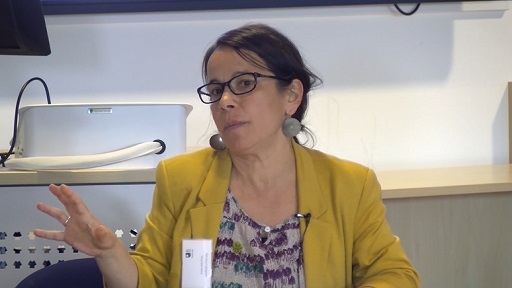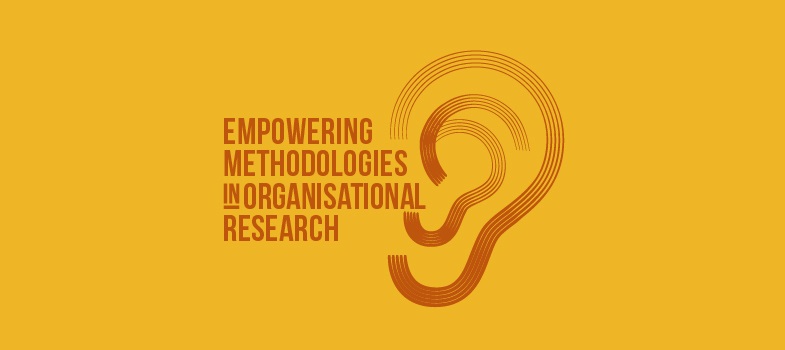Decolonising management knowledge and research practice
Activity: Film Focus 5, ‘Decolonising management knowledge and research practice’ – Emanuela Girei, University of Sheffield, UK
Watch the film and make your own notes in response to the following questions:
- What parallels and contrasts can you draw between Dr Girei’s experiences in the field and the concept of research as a craft? (See Section 2.)
- Can you identify any political agenda in your own research? What (in)visible forms does it take?
- Who has benefited/will benefit from your research?

Transcript
Why do we need to talk about colonising knowledge? Let me just show you a few slides which show where authors, editors and reviewers come from in management journals. In 2012, we have the results, very interesting results, published in Organisation, written by Murphy and Zhu. And as you can see here, [with] the question, ‘Where is knowledge management produced?’, the great majority – they did the results looking at top-tier journals – and the great majority of authors come from the US and the UK. And from these slides, you can see that there are entire parts of the world like Africa, which are not even present, and India as well.
So this is the authors. But maybe it’s different from the editors? No, if we look [at] the editor’s affiliation, we have a very similar picture. The great majority of them comes from the US and the UK. And there again, we have entire parts of the world that are completely absent.
There is an interesting cartogram which represents their world following these figures. And you can see that Latin America and Africa are almost inexistent. So this is a picture of where does management knowledge come from. And this is also important – I lied – that not only authors and editors come from the US, from the US and the UK especially, but also the organisations that they study are mainly based in the West. So management knowledge is predominantly a Western discipline.
Have things changed in the last few years? We had a few last year, another report published by Publons [based] on the web science database and other data. And, again, here you can see that as the distribution across the world of editors and, again, of editors and of reviewers. And, again, you can see that US and UK and the global north in general, they play definitely a dominant position.
So on the basis of this data, and also more in general, we can if we talk in general about management knowledge, we face three main problems, if we talk about management knowledge and the global south. One is absence. Because, as we have just seen, management knowledge is produced mainly in the West and looking especially [at] Western organisations.
But there are other two key problems that we face when we talk about when we are concerned about the colonising management knowledge. And one is about these pervasive dimensions of orientalism and occidentalism in management and organisation studies. And another pervasive dimension is that of misrepresentations. What do I mean with these three key concepts?
Orientalism, you might be familiar with the work of Edward Said and of many other African scholars, such as Mudimbe, Kebede, which have analysed especially in [an] anthropology context how African and, more in general, the global south, were represented. And what emerged was a binary Manichian thinking according to which there was on one pole, the superior West, and on the other pole, there was the inferior global south, the inferior colonies. And the representations of Africans and [the] South Asian population were mainly developed along this binary thinking where the second pole, that of the colonised, made reference in a sense only with reference to the former. They did not have independent conceptual existence.
Have things changed in management, knowledge management and organisation studies? According to many scholars, not. In management and organisation studies currently, we still find that those dimensions of orientalism and misrepresentation that were part of the anthropology context at the beginning of the century. And on the basis of this, for instance, Prasad talks about the Westocentric nature of management organisation studies, which continues to assume the West as the norm and the lens to which study organisations and workers across the world.
And the interesting part of orientalism is that if a non-Western – or if an organisation in the global south deploys some practice that is not known in Western management, it is considered traditional, backwards, and in absolute need of modernisation. While if some practice that is taken for granted and widespread in the West is not present in organisations in the global south, then they need training, capacity-building.
My background is in development studies. And so I did a lot of studies regarding capacity-building of organisations and institutions in the global south. And this dimension is very much present. But it is also interesting to see that together with orientalism, management studies also suffers of what is being called occidentalism, which means that despite the fact that management and organisation studies mainly ignores the rest of the world, Western management knowledge is considered universal and valid everywhere in the West – everywhere in the world.
My way of seeing decolonised knowledge is knowledge it is meaningful in the context with where it is produced and that is meaningful for the person and the citizens and the communities that are involved in the knowledge production process. Is it indigenous knowledge, is it Western knowledge? I don’t know. This is not the relevant question for me.
What I try to do in my research is to produce knowledge that is first of all relevant and meaningful for that context where the research takes place. And in focusing on the local context does not mean escaping or neglecting macrodynamics of power, does not mean ignoring what is happening outside our small context of the research. It’s more a way to think continuously between the micro level where the research takes place and the macro level of knowledge production and what can we use – the macro global political economic frameworks to understand what we are observing the fears, but also to use what we are observing the fears to understand what is happening at a more global level.
So with regard to this question, ‘What is decolonised knowledge?’ On the basis of my experience, what I use as a normative principle for my research is that decolonised knowledge is a knowledge that is meaningful for the people I’m working with. And this is the first – one of the first steps. It is also very important to focus on the unit of analysis of the place where we are working.
Because this also helps us to overcome one of the key features of the colonial thinking in management knowledge, which is what we mentioned before, orientalism, and this attitude of studying non-Western organisations through the comparative lens using the West as a norm and the local organisation – to use the West as the lens to study a local organisation. To focus on radical contextuality helps us to go beyond orientalism. Because it helps us to go beyond these comparative lenses. And it helps us to give independent conceptual value to the reality that we have in front of us.
How do we decolonise management knowledge? Through which processes we can decolonise management knowledge? One of the key principles that I try to follow in my research is that of embracing an open-ended stance, which means liberating as much as possible the research from predefined frameworks, or paradigms, or approaches.
It’s something linked to dropping that tool that was mentioned in the opening talk. And this is really important. Because when I started my research, I did my PhD in Uganda. And I started with the aim of doing a critical, participatory action research.
And only through the field, through the work in the field, I have realised how much constraint I was putting on my participants. Because I wanted to have meetings and the cycles of action and reflections, because I wanted to focus on our questions. And it was an enormous constraint on the research setting.
And that was even if I was starting from a participatory critical approach, I was setting the agenda. I was leading the research process. So I had to learn slowly to leave, to really leave the stick and also to sit down and observe and also spend days just participating in meetings, some observing what my colleagues were doing.
And renounced the first few weeks, I tried to organise reflective meetings. But I was the only person interested in those reflexive meetings. They were not important for my colleagues. So this open-ended stance, I think, is a way that might help us to identify ways of working and to identify ways of doing research, which may be innovative and beyond the Western canons.
Another key principle of my methodological approach is what I would call activist research methodologies, which really based recognise negotiation, participation, interaction with the research participants as an epistemological position; which recognise that in order for us to be able to decolonise management knowledge, we need to open the voices and we need to engage with meanings, perspectives that are outside our frameworks. And these can only be done through research settings that leaves the space for the research participants in whatever forms, including resistance to the research process itself. And I will return on this point in a second.
The third point, which I think is really, really important, is in terms of how do we do our research – is that of a political engagement? As we were saying before, value and politics is part of the research. Any research project will serve specific interests. Are we aware of who is benefiting from our research? How are we aware of which interests our research is serving? There is not any level of neutrality or suprapolitical objectivity. All research [has] a political agenda. And, for me, decolonising management knowledge means also making this political agenda clear, making this political agenda and stance of the research process itself, and making it clear who I would like first and foremost to benefit from my research.
We recommend that you keep notes of your answers to these questions so you can return to them during the course.
Postcolonial and indigenous management research
